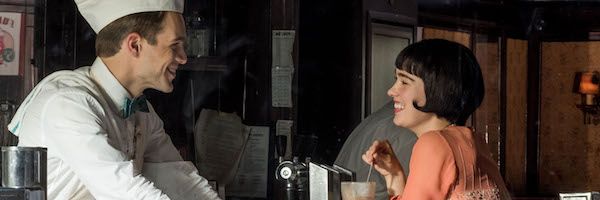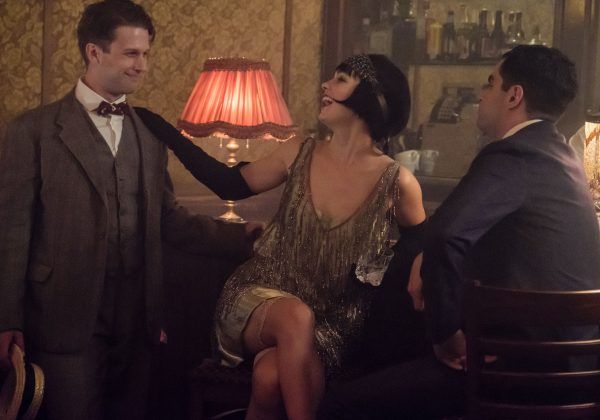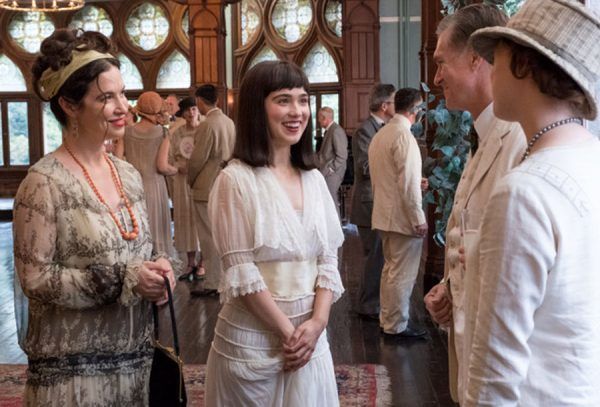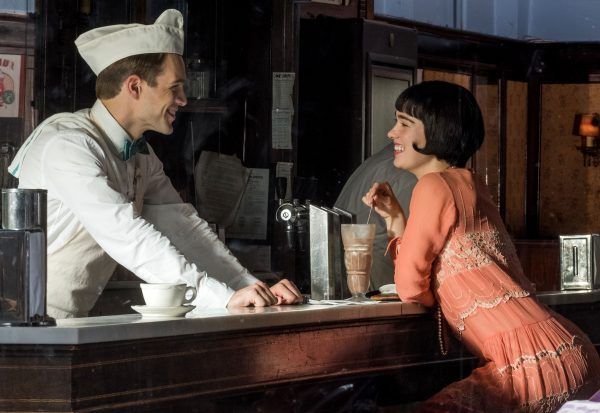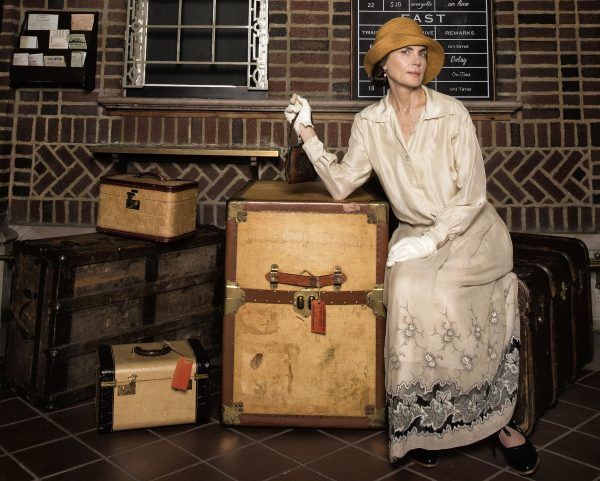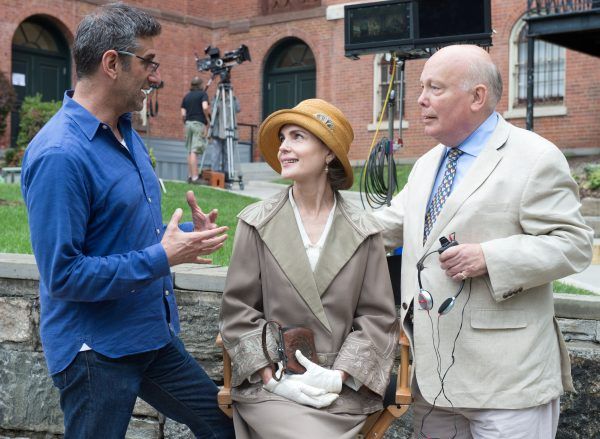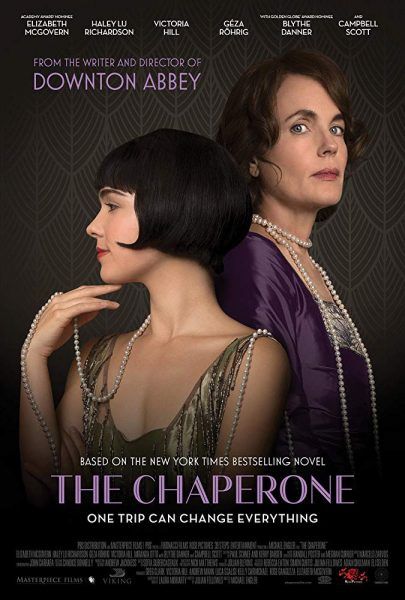Directed by Michael Engler and written by Julian Fellowes (both of Downtown Abbey fame), the early 1920s period drama The Chaperone tells the story of free-spirited Louise Brooks (Haley Lu Richardson), a teenager from Wichita, Kansas who got the opportunity to go to New York to study with a leading dance troupe, before she ultimately went on to become a silver screen sensation. But because of her age, her mother insisted that she be accompanied by a chaperone, which brought local society matron Norma Carlisle (Elizabeth McGovern) into her life and established a bond over that summer that would never be forgotten.
During this 1-on-1 phone interview with Collider, actress Haley Lu Richardson (Five Feet Apart, Support the Girls) talked about why this role was so appealing to her, learning about the real Louise Brooks, how quickly she had to prepare for the project, how the wardrobe affected her performance, and getting to dance in the film. She also talked about wanting to work with Columbus filmmaker Kogonada again, her hope that she’ll get to dance more in films, trusting her instincts about possible roles, and her desire to be more involved with the production aspect of her work.
Collider: I thought you really did beautiful work in this film. Louise Brooks was such a fascinating person that I could easily see why it would be appealing for an actor to want to play someone like her. When you read this script, was getting to explore someone like this what made it most appealing?
HALEY LU RICHARDSON: Yeah, and it was even before I read the script, when I got this email from my agent that said, “They’re interested in you playing Louise Brooks.” I Googled Louise Brooks because I didn’t one hundred percent know who was, to be honest, and I immediately figured out that she was iconic. I’d never gotten the chance to play someone that was such a known and iconic real person. So, even before I read the script, that was exciting and intimidating.
I have to admit that I had not even heard of Louise Brooks before I watched this movie, and I was totally fascinated by her and her life.
RICHARDSON: Yeah, she was definitely a really interesting person. She was very complicated, from what I gathered with all of the research I did and everything that I read about her, and I think she deserves a whole movie, herself, because she really was so different than so many other women of her time. She was so ahead of her time, with the things that she went through and how she let those things effect her, and how they impacted and changed the person that she became and the person that she showed to the world. She definitely was really complicated. It was interesting and challenging to explore her when she was younger, before her fame, because there wasn’t a lot out there about her, at that time of her life. There was a lot that was left to my imagination, based on other things that I learned, but there are things that are public knowledge, about her childhood. There were also things that she went through, when she was really young and in Kansas, that she never really got over. She definitely lived a really interesting life and was so inspiring, in a lot of the ways that she would act and the things that she cared about, but there was also a lot of pain. At the end of her life, she lived alone, in a small, shitty apartment in New York, by herself. She died young, as an alcoholic. To get to a place like that, after having lived a life that she lived and having the success that she had, there must have been a lot of internal turmoil for her.
When you play a real person that you can research, do you get to a point where you just have to stop doing that research, or you’ll stay down that rabbit hole?
RICHARDSON: Yeah. The thing that sucks is that I came onto this movie so last minute. They already had everything together, and then something had happened with the person who was supposed to play Louise Brooks. I don’t know what exactly went on, but I came in really last minute and had less than three weeks to learn as much as I could about Louise Brooks, understand the accent of the ‘20s, along with her being from Wichita, and I’d never done a period movie before, playing a real person. So, I was learning about Louise, what was important to her, and what she was going through, at that time in her life, and then memorizing the lines, learning the stances, and all of that. It was a lot, for a short amount of time. I honestly was really scared because my agents were really excited when they said, “They’re really interested in you playing this character.” I was excited, but even more so, at the beginning, I was like, “I don’t even know if it’s possible. I don’t know if I can actually learn enough, in this short amount of time, to be able to do a good job, or to be happy with myself, at the end of the day. I still don’t honestly know if I learned enough. I wish I had way more time. I think most actors, when they’re playing someone that’s real and known and loved, in this way, want a year to learn as much as you possibly can and to watch every single film that they’ve been in, but I didn’t get to do that. I really had to be honest with myself, when deciding if I was gonna do it, if I could do it. I still honestly don’t know if I ever answered that question, fully. I just decided to do it, and then dove into it and hoped for the best. I do feel like there were moments, when I was on set, where I felt like I was genuinely tapping into her, or something that felt really true, and that felt like it wasn’t me. I didn’t feel that in every single scene, but there were times where I genuinely felt that, which I’d never felt before because I’d never gotten to play a real person. There were times where I felt really connected to her and understood her, but even now, over a year after we filmed it, I feel like there’s so much more that I could look up about her.
Hearing all of that, I’m even more impressed with the work that you did because I thought you were really extraordinary in this.
RICHARDSON: Well, thanks. I wasn’t trying to sound impressive. If anything, I literally just hoped for the best. The main thing that helped me to really connect to her were direct quotes from her. Some of them were more famous quotes, and then some were things that I read in a random book, or found after digging on the internet. I just felt like those things were so telling about who she was, as a person, and what was important to her, and how the things that she did affected her. There were a handful of quotes where, if I was trying to get into a scene or to connect to her, I would just say them to myself to try to remind myself of who she was, what was important to her, where her mind was, where she was coming from, why she did a lot of the things that she did, or why she would say the things that she said.
Did this wardrobe and hair also help inform your performance?
RICHARDSON: Oh, yeah, totally. I feel like this is probably the most that I’ve transformed. I had to put in brown contacts, every morning, which I actually got allergic pink eye from, half-way through filming. There are literally scenes where you can see my pink eye and that I’m desperately trying to cover it up, even though you can’t really cover up pink eye. And then, there was just getting into that ‘20s world, which I’d never gotten to explore before. It’s definitely helpful, when you can see that change.
I watched an interview with the film’s screenwriter, Julian Fellowes, and he said that he thought you were great in this because you’re wonderfully wild, you are someone who’s always marching to your own drum, and you’re un-frightened by the filming process. Do you feel like that’s a fair description of you?
RICHARDSON: He said that about me?! Oh, my gosh! Every time I start a job, I feel like I forget how to act, and then, after the first day, I’m like, “Oh, yeah, okay, I remember these things now.” So, I don’t know if I have a fear, but there’s some intimidation, or second-guessing of myself, sometimes. But yeah, I definitely march to the beat of my own drum. I’m living in my own world, most of the time, which is a good thing, but can sometimes get me in trouble. I definitely think Louise, aside from the pain that she held onto, from things that she’d gone through, in her childhood, and how that affected her, was a free spirit, even despite those things. She did things almost opposite of the way that you’re suppose to do them, which I respect. There’s nothing that sucks more than someone who’s just doing things because it’s the way everyone else does it, or because they feel like that’s how they’re supposed to do it. I always respect and admire people who go against the grain or break the mold, even if it’s too far. I think Louise Brooks was like that, and she almost did it for shock value. Maybe I’m like that a little bit, too, sometimes.
You also do dance scenes in this. What was it like to get to do that?
RICHARDSON: That was also a big part of why I was so excited to do this. I got to play Louise Brooks, but Louise Brooks was also a dancer. And at this time in her life, before she got into acting and movies, she was a part of the Denishawn company, which was a really pivotal moment for dance and for the world, in general. It was very parallel to what society was going through, at that time. The Denishawn company was a big deal. I remember learning about that, in my dance classes in high school. It was the introduction of modern dance in America. I just feel like that was a huge perk, being able to dance a little bit in this movie, and I hope that I get to dance more in movies because dancing and acting together is my dream. That’s what I really want to be doing, so it’s cool that this is a stepping stone to more dance/acting stuff, hopefully.
Do you have any idea of what you’re going to do next, or what you’d like to do next?
RICHARDSON: Yes, I have a lot of ideas. I don’t know exactly what my next thing is gonna be. I know that I wanna work with (writer/director) Kogonada, who did this movie, Columbus, that I was in, two years ago now. I would be in any of his movies. I really wanna make more stuff with him because he’s so smart. He’s actually a genius. I wanna make dance movies. I’m trying to be really patient for scripts and stories that come along that genuinely, really excite something in me. I have a lot of ideas. I’m just waiting for them to happen.
That shift between taking the roles that you have to take because you want to keep working, and doing only the roles that you really want to do is hard to figure out sometimes, but you’ve been doing some really interesting projects and playing some really cool characters.
RICHARDSON: Well, thanks. I feel like I’ve always really trusted my instincts. Even when I first started acting and I was desperate to do anything, I still had some trust in my instincts, for when things were really bad or really shitty, or something that had nothing to do with me, or something that wouldn’t excite me or be interesting for me. You definitely have to do things to keep getting work, but the kinds of jobs that you do are the kinds of jobs that you’re gonna get. So, as I keep moving, I don’t want to do something that’s not in the direction where I wanna be going. That’s something that I’ve been thinking about. I’m not really interested in doing the same thing twice, or playing the same type of character twice, and telling the same type of story. I just feel like there are so many different stories to be told and to get to learn about and people to portray, so I just don’t wanna get trapped in some genre, or thing, or character.
Do you feel like you’re getting to a point where you would like to start producing stuff, so that you have more of a say in the development of what you’re doing?
RICHARDSON: Yeah. I haven’t given a ton of direct thought to that, but hopefully, that kind of stuff will happen, naturally, when I work with people. It’s such a collaboration, to begin with. If it’s a healthy, positive environment, it’s supposed to feel collaborative. You’re supposed to feel like you’re in it together, and you’re creating something together and sharing things. Hopefully, that will naturally happen, where if I have an idea and someone wants to make it with me, then I can be even more of a part of that process. There are definitely things that you just don’t really have any control over, as an actor, that I’m trying to learn to accept, but it would be cool to be more of a part of the production aspect, and to be able to have your voice heard in those other areas.
The Chaperone is now playing in select theaters.

